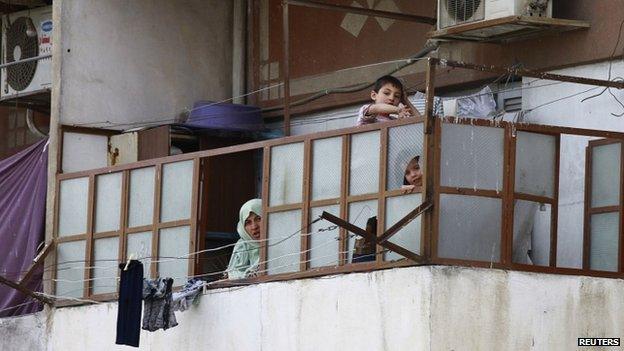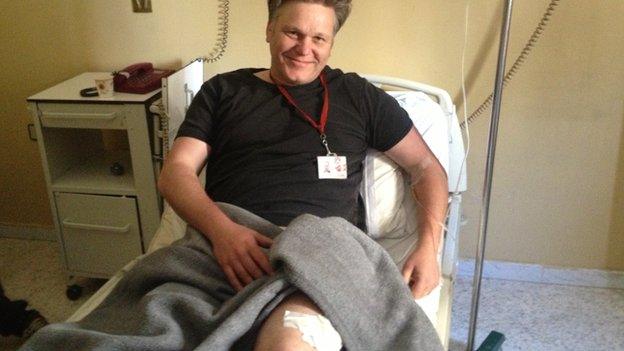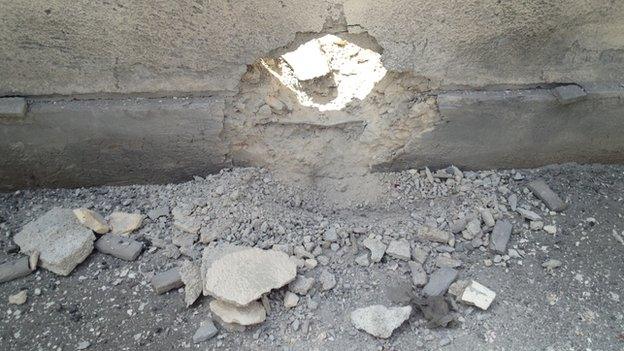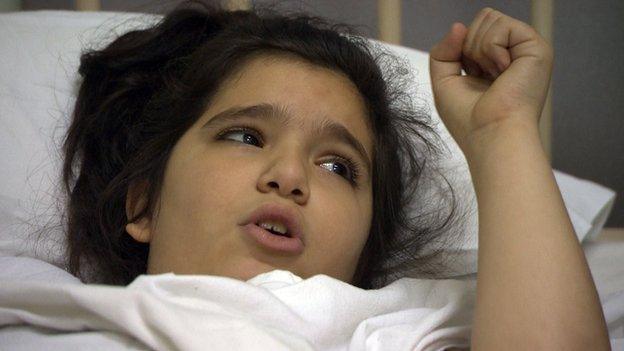Syria crisis: Russian roulette of random attacks
- Published

Minutes later… or before. Metres on one side… or the other. That can be the measure between life or death in Syria. That's the cruel consequence of random attacks in a ravaging war.
"If the mortar had landed 15 minutes later, the children would have been in their classrooms," lamented a school official in the Bab Touma area of the Old City of Damascus not long after a mortar slammed into a schoolyard full of children this week.
"At 07:45 in the morning, nearly 300 children were playing outside."
Mortars are inaccurate, indiscriminate, and many more are landing in cities across Syria.
They're believed to be fired by rebels, but the government is also accused of launching them into neighbourhoods under its control. So brutal is this war that nothing is considered unthinkable.
The impact of small crude mortars is limited compared to far more powerful weapons like the improvised barrel bombs, packed with explosives and metal, being shoved out of Syrian military jets in the northern city of Aleppo, and elsewhere, causing carnage.
But they are part of all the weapons of war that now reach all parts of Syria.
"I have started to believe there is no moral difference between a barrel bomb and a mortar," reflected a senior church cleric in Damascus who, for the past three years, has tried to steer a middle path through a polarising punishing war.
Daily ordeal
On Sunday, we saw two mortars land, sending up clouds of white smoke, a few hundred metres from where we were stuck in a Damascus traffic jam that snaked across the length of a major flyover.
On some days, up to 100 mortars have hit central areas of the city, while the Syrian military pounds rebel strongholds in suburbs that lie in ruin.

BBC cameraman Phil Goodwin took fragments of shrapnel in his leg and chest
On Tuesday, we saw the aftermath of the mortar round which crashed into the schoolyard where children were assembling for the start of classes. Torn trainers and little black shoes ripped in two were stuck in dark pools of congealed blood.
One boy, Sinar Matanious, died instantly that day. Sixty children and teachers are being treated for injuries, including a young girl whose two legs had to be amputated.
On Wednesday, we heard a loud blast when we were inside a school used as a shelter for displaced families in the city of Homs.
Children who had recently escaped the painful siege of the rebel-held Old Quarter were in the midst of describing their frightening ordeal there of living under constant bombardment and gunfire.
We rushed into a corridor filling fast with smoke to check if all the families, including 90 children, were safe.

This photo shows the damage done by the mortar attack on the former school in Homs
It was our own colleagues who emerged from the haze, limping and moaning.
Cameraman Phil Goodwin took four fragments of shrapnel in his leg and chest. Producer Natalie Morton suffered slight burns from the metal that flew in all directions.
Theirs was the luckiest of escapes. "Many Syrians [are] not so lucky," Phil wrote on his twitter account, external.
A small mortar round pierced the bottom edge of the concrete wall protecting the shelter. Fifteen or 20 metres further, and it would have landed in the playground where children were running and screeching as they chased after a ball.
A metre in the other direction, it would have landed on top of two BBC vehicles parked in the lane where my colleagues were sitting.
As it was, the wall was sprayed with shrapnel, two white vans were peppered with jagged holes, their windows shattered.
'We are brave'
The children, huddled with parents, looked on, quiet and wide-eyed. It wasn't long before they were running and giggling as children do.
But when I went to speak with some of them, one boy with a tussled mop of hair traced a line from his big brown eyes down his cheek to let me know he had been crying.
Another with an impish grin who stood just behind him plucked up courage to admit the same.
That's the impact that stays with children who have already lived through far too much.
On Tuesday, in the Damascus hospital where children and teachers were being treated, nine-year-old Hiba told me her leg was " a little broken, burning a little."

Nine-year-old Hiba Khalil was injured in a mortar attack on her school
"You're a brave girl," I said.
"Yes, we are brave," she replied, with a hint of a pout.
"But what does brave mean?" she asked, pushing back her long dark locks of hair.
"All the children are injured. A lot of blood was spilled on the floor of our schoolyard. Our principle Maya is in surgery. A lot of teachers were injured."
"It's Russian roulette," regretted one mother, referring to the deadly game of chance. Her own child narrowly survived a mortar attack a few weeks earlier.
"You spend the next few days with 'What if?' spinning through your head," she said.
What if the missile, the mortar, the moment came a few minutes before or after, a few metres to one side or the other?
Syrians live, day in, day out, with gnawing questions to which there are no answers, no assurances that life will soon be any different.